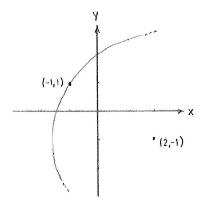Lösung 4.1:5b
Aus Online Mathematik Brückenkurs 1
K (Lösning 4.1:5b moved to Solution 4.1:5b: Robot: moved page) |
|||
| Zeile 1: | Zeile 1: | ||
| + | If the circle is to contain the point | ||
| + | <math>\left( -1 \right.,\left. 1 \right)</math>, then that point's distance away from the centre | ||
| + | <math>\left( 2 \right.,\left. -1 \right)</math> | ||
| + | must equal the circle's radius, | ||
| + | <math>r</math>. Thus, we can obtain the circle's radius by calculating the distance between | ||
| + | <math>\left( -1 \right.,\left. 1 \right)</math> | ||
| + | and | ||
| + | <math>\left( 2 \right.,\left. -1 \right)</math> | ||
| + | using the distance formula: | ||
| + | |||
| + | |||
| + | <math>\begin{align} | ||
| + | & r=\sqrt{\left( 2-\left( -1 \right) \right)^{2}+\left( -1-1 \right)^{2}}=\sqrt{3^{2}+\left( -2 \right)^{2}} \\ | ||
| + | & =\sqrt{9+4}=\sqrt{13} \\ | ||
| + | \end{align}</math> | ||
| + | |||
| + | |||
| + | When we know the circle's centre and its radius, we can write the equation of the circle, | ||
| + | |||
| + | |||
| + | <math>\left( x-2 \right)^{2}+\left( y-\left( -1 \right) \right)^{2}=\left( \sqrt{13} \right)^{2}</math> | ||
| + | |||
| + | |||
| + | which the same as | ||
| + | |||
| + | |||
| + | <math>\left( x-2 \right)^{2}+\left( y+1 \right)^{2}=13</math> | ||
| + | |||
{{NAVCONTENT_START}} | {{NAVCONTENT_START}} | ||
[[Image:4_1_5_b-1(2).gif|center]] | [[Image:4_1_5_b-1(2).gif|center]] | ||
| - | <center> [[Image:4_1_5b-1(2).gif]] </center> | ||
| - | {{NAVCONTENT_STOP}} | ||
| - | {{NAVCONTENT_START}} | ||
| - | <center> [[Image:4_1_5b-2(2).gif]] </center> | ||
{{NAVCONTENT_STOP}} | {{NAVCONTENT_STOP}} | ||
| + | |||
| + | NOTE: A circle having its centre at | ||
| + | <math>\left( a \right.,\left. b \right)</math> | ||
| + | and radius | ||
| + | <math>r</math> | ||
| + | has the equation | ||
| + | |||
| + | |||
| + | <math>\left( x-a \right)^{2}+\left( y-b \right)2=r^{2}</math> | ||
Version vom 11:20, 27. Sep. 2008
If the circle is to contain the point \displaystyle \left( -1 \right.,\left. 1 \right), then that point's distance away from the centre \displaystyle \left( 2 \right.,\left. -1 \right) must equal the circle's radius, \displaystyle r. Thus, we can obtain the circle's radius by calculating the distance between \displaystyle \left( -1 \right.,\left. 1 \right) and \displaystyle \left( 2 \right.,\left. -1 \right) using the distance formula:
\displaystyle \begin{align}
& r=\sqrt{\left( 2-\left( -1 \right) \right)^{2}+\left( -1-1 \right)^{2}}=\sqrt{3^{2}+\left( -2 \right)^{2}} \\
& =\sqrt{9+4}=\sqrt{13} \\
\end{align}
When we know the circle's centre and its radius, we can write the equation of the circle,
\displaystyle \left( x-2 \right)^{2}+\left( y-\left( -1 \right) \right)^{2}=\left( \sqrt{13} \right)^{2}
which the same as
\displaystyle \left( x-2 \right)^{2}+\left( y+1 \right)^{2}=13
NOTE: A circle having its centre at \displaystyle \left( a \right.,\left. b \right) and radius \displaystyle r has the equation
\displaystyle \left( x-a \right)^{2}+\left( y-b \right)2=r^{2}

